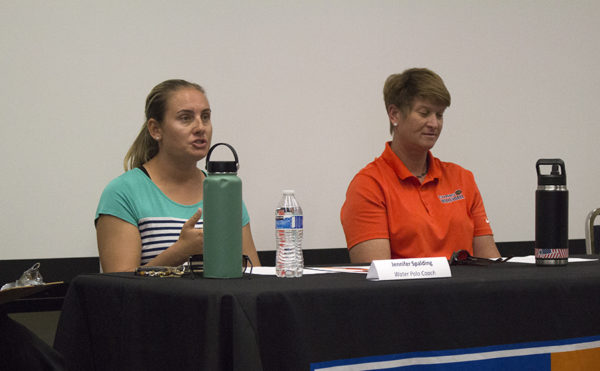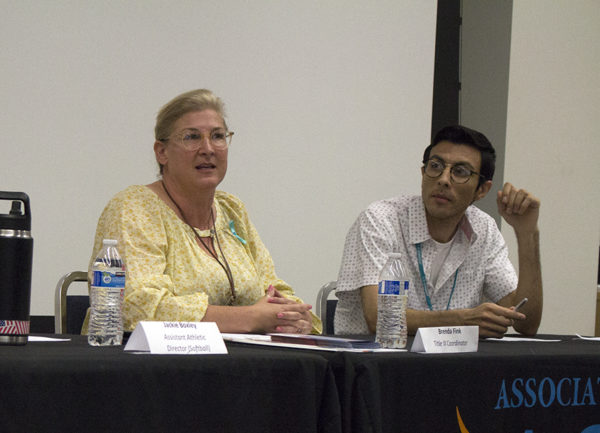The #MeToo panel discussion and the documentary “The Hunting Ground” were insightful and appropriate for Sexual assault awareness month, but few students attended the events.
Too few people attended the #MeToo panel discussion held on April 10 in the lecture room in the Visual Arts building, missing out on a discussion with an open and interactive atmosphere with professionals.
While the room can hold over 100 students, only about 20 people came to the two-hour event, most of the attendees were in some capacity involved in student government.
The panelists, Brenda Fink, title IX coordinator, Jennifer Spalding, water polo coach, Jose Hatem, representative from Project Sister Family Services in Pomona, and Jackie Boxley, the assistant athletics director, were open and casual with students while remaining professional. They covered a wide range of topics relating to the #MeToo movement, including sexual assault, social media’s impact, society’s taboo against sex and sexual discrimination in the workplace.
Fink began by mentioning how the #MeToo movement had really started in 2006 by activist, Tarana Burke. Burke’s biography, https://www.biography.com/people/tarana-burke, says she coined the phrase when she was involved in the nonprofit Just Be Inc.
The phrase “Me Too” received a surge of attention again in 2017 when actress Alyssa Milano used it on twitter. Milano urged women who had been assaulted to respond “Me Too” to her tweet to speak out in solidarity with women assaulted by Harvey Weinstein. The response became its own hashtag.
With the expansion of social media, the hashtag was able to reach more people instantly, causing the current #MeToo movement to reach a larger audience with more interaction than ever before.
“People are coming forward more because they can hide behind their phones in a way … which I think is amazing,” Spalding said.

Over the course of the discussion the panelists gave this advice to students: educate yourself, respect yourself and don’t blame yourself.
Panelists repeatedly urged the audience to be educated on what sexual assault is, however, they did not explain it during the discussion, which would have been the most appropriate time to do so.
They did occasionally give examples or hypothetical situations, but the speakers could have prepared definitions for things like “sexual assault”, “sexual discrimination”, “title IX” and other phrases that were being used that the audience may have heard before, but were unable to define. Or they could have supplied resources for students to do the research on their own.
The discussion kept coming back to society’s taboos about sex and gender roles. The panelists seemed to agree that many male victims of sexual assault are silent because of society’s expectations of men to be strong.
Boxley made a point that students can still come to college faculty for aid even if an assault did not happen on campus.
“If you have things going on off campus, by all means come talk to us,” Boxley said. Boxley is a softball coach and teaches a self defense course at Citrus College that she encourages people to take.
Boxley strongly recommended students watch “The Hunting Ground”, a documentary about sexual assault on college campuses. The documentary was shown 1 p.m. on April 11 in the Student Center, ED 170.
The documentary was more specific and factual than the panel discussion, mainly because of the research presented and personal stories from college age women and men that experienced sexual assault on their college campuses. “The Hunting ground” is available of Netflix.
Most students can not attend all of the Sex 101 events due to classes, but showing “the Hunting Ground” directly before the #MeToo panel would have given the audience a better understanding of Title IX and sexual assault for the discussion.



